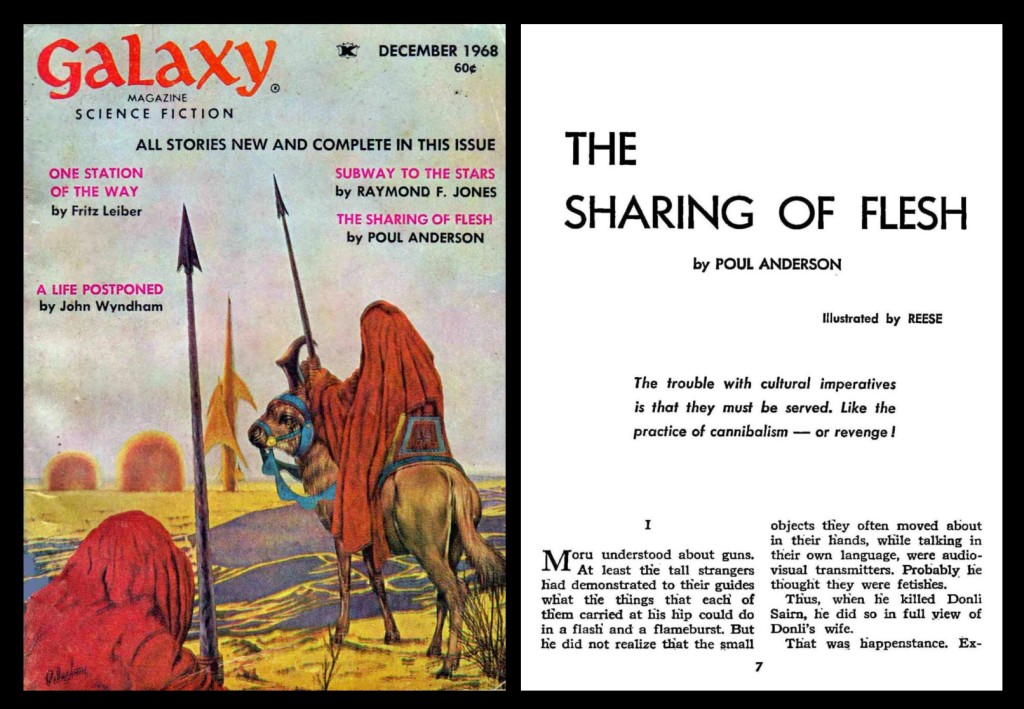
“The Sharing of Flesh” by Poul Anderson first appeared in the December 1968 issue of Galaxy Magazine. It won a Hugo award for best novelette in 1969 and was also nominated for a Nebula award. As soon as I started reading it in The Hugo Winners Volumes I and II edited by Isaac Asimov I knew I had read it before. The trouble is I can’t remember when and how I read it before, and that annoys me. I do remember getting that issue of Galaxy back in 1968, but if I only read it then, it wouldn’t have been so fresh in my memory. With this reading, it felt like I must have read it just weeks ago. Everything portion of the story as I read it came back to me.
“The Sharing of Flesh” is about humans discovering a planet that was previously colonized by humans but forgotten. This is the third story in the past couple of weeks I read using this theme. The other was Anderson’s own “The Longest Voyage” and Nicola Griffith’s Ammonite. “The Sharing of Flesh” is a murder mystery with a sociological/biological twist. It’s the kind of story I don’t want to spoil by summarizing it. I would link to Archive.org so you could read it online, but that issue of Galaxy has the story removed, meaning the Anderson estate requested the cut. It is available in Call Me Joe: Volume One of the Short Fiction of Poul Anderson from NESFA Press. (I did find it online later.)

I checked ISFDB.org to see where “The Sharing of Flesh” has been reprinted, and I don’t own any of those anthologies or collections except The Hugo Winners Volume I and II. I suppose I could have read “The Sharing of Flesh” there, but I don’t think so.
I know you’re probably thinking I’m overly obsessed with memory, but recalling when, where, and how I read a story is important for two reasons. First, I’m getting old, and I’m slowly losing my ability to recall. Working to remember is good exercise for my mind. But second, and more importantly, the memorability of a story is a measure of its quality. If words etch into your mind and they stay there for years, there’s a good reason.
Despite all the millions of short stories published, and the thousands that I have read, the memorable ones only number in the low hundreds, and the ones worth cherishing over a lifetime, add up to just a handful of tens.
“The Sharing of Flesh” is memorable because it’s about something grotesque and horrifying, yet its resolution is about forgiveness. The story is about transcending upbringing and culture. It’s incredibly positive. Yet, I don’t know if I’d put “The Sharing of Flesh” into the all-time classic category. I might need to read it a couple more times before I decide. Still, it makes me think I need to read more Poul Anderson.
Even the illustrations from Galaxy are so familiar to me. I must wonder if I read it back in 1968. If I did, I don’t think I’m remembering that time. I wish I had kept a journal from the time I first started reading. I probably read “The Sharing of Flesh” recently because some blogger mentioned it, and I went and read it. If you remember, let me know.
That’s another thing I’d like to remember. I’d like to remember other people by the stories they love. I wish I had started worrying about memories when I was a child. Who knew they’d be so important to me now?
I’m beginning to realize that stories I love are like my genes, they define who I am.
James Wallace Harris, 2/1/24

You and me both! I knew I’d read the story, but couldn’t remember it at all. Only after reading it yesterday and posting my comment today, did I look at my note from ten years ago. It says almost exactly what I said today, except that I rated it higher this time.
You can still read the magazine at the Luminist Archives.
LikeLike
This might be my favorite Anderson short story, and I’m a little puzzled that it hasn’t been reprinted more often.
LikeLike
Did you review it on your site? If so, that might be why I read it before. I vaguely remember you recommending a story to me too.
LikeLike
Nah, I reviewed a couple different Andersons.
LikeLike
So, it’s still a mystery.
LikeLike
If this is the story I remember it may have also been in an anthology of anthropology in SF. I have an amazing ability to read and then forget stories but that I remember clearly.
LikeLike
Yes, it was in ANTHROPOLOGY THROUGH SCIENCE FICTION. See here for the table of contents. https://www.isfdb.org/cgi-bin/pl.cgi?303380
LikeLike
Thank you for pointing me to this novelette which I didn’t know before, though I’ve read a lot by Poul Anderson. I have translated your post as well as the story itself (which to my knowledge has never been published in German):
Poul Anderson: Das Teilen von Fleisch – AstroSciFix (wordpress.com)
The ending of „The Sharing of Flesh“ reminded me of the final confrontation between Rick Deckard and the replicant Roy Batty in Ridley Scott’s original „Blade Runner“:
For those who know (or remember) too little of this movie to fully appreciate Roy Batty’s situation and his final decision – see this recommendation by Critical Drinker (13 min.; „timeless and dreamlike“, as he puts it, is also true for John Boorman‘s film „Excalibur“; see my comment here):
Those who have read „The Sharing of Flesh“ will know what parallel I see between the endings of both these stories; for the others I won’t spoil Anderson’s resolution by describing what I see as one similar motivation for Roy as well as for Evalyth Sairn.
„The Sharing of Flesh“ really pulled my heartstrings, the bright as well as the dark ones, because I often think about the topic of revenge in the context of what I would do if a person as dear to me as Donli Sairn to his wife Evalyth would be killed by somebody, perhaps in a similarly horrific way.
I won’t expand here on what kinds of people I have in mind in this context, and the hate and revenge fantasies I can get into when imagining such a situation. On the other hand I’m repelled by the thought of how my mourning memories of the avenged person would be forever stained by the memory of the act of revenge.
This is also one of the themes in my short SF novel „Über die Hügel und zu den Sternen“ („Over the hills and to the stars“, 9 chapters), where it concerns one of the five characters representing various sides of myself.
LikeLike
When you do a translation, do you do it yourself or use a computer translation?
I’ve always loved the Crying in the Rain scene from Blade Runner. However, I didn’t make the connection to it at the end of “The Sharing of Flesh,” but I can see why you did.
You need to add the widget to your site that allows people to subscribe to it by email. I’m bad about keeping up with blogs, but I try with emails.
Jim
LikeLike
Hello Jim!
I do my translations myself, with the help of dict.cc | Wörterbuch Englisch-Deutsch as an online dictionary. This way it is more satisfying for me; it’s a bit like what Adam savage says in his Video „How to Deal With Creative Block“ (beginning at about 7:15)…
…where he mentions that writer Mary Karr copies works by authors she loves in long form when she has writer’s block; she says that even when it’s not her own words this greases her mental gears and feels a bit like writing herself.
According to my own experience I engage much more with a text that I like when I copy or translate it, compared with just reading it; it’s a difference similar to hiking through an area versus just zipping through by car.
For a collection of Adam’s videos on creative processes see this post:
The “Tears in Rain” scene is really a poignant one, and I feel this the more I get older (this summer I’ll turn 64).
I think I have activated the subscription widget now; tell me whether it appears now. It must have been active before, because I have some subscribers, but maybe it vanished after the new WordPress editor was introduced.
Günther
LikeLike
I have Mary Karr’s memoir on creative writing. I should practice copying prose from various writers. That sounds like a useful learning technique.
I subscribed.
Are you interested in AI? Lots to think about there.
LikeLike
Thanks for subscribing! And what an interesting coincidence that you happen to own that book by Mary Karr. One other thing that I’ve noticed when copying or translating other people’s prose is that lengthy, tiresome sections or the overly frequent use of the same words and phrases are more apparent to me than when I only read these texts.
Yes, I follow the development of AI closely and think a lot about it. Although I myself am safe from its impact on employment (because I’m retired) I’m worrying for others who do not yet have this security. Also I see it as a problem for SF worldbuilding: what work will all these regular people do in the future? And what will it do to human creativity when images and stories that artists and writers take weeks or months to create can be produced by computers within seconds or minutes?
Sabine Hossenfelder has posted several videos on this topic lately, and in one of them she says that all tasks involving reading and writing (i. e. processing of text) will be among the first to be taken over by AI algorithms.
As you may have noticed I have read your posts on AI as „Artificial Subconsciousness“ and Ursula K. Le Guins „Omelas“ story, and maybe I will do translations of them as a combined post for my blog. But not before I have finished at least Chapter 8 of my current SF story project.
One idea that I present in it pertaining AI is that corporations might on one hand shy away from developing AI that might have sentience and self-awareness as to avoid having to grant them the rights of persons, in which case it would be slavery to own them. But on the other hand, as they would desire to use such strong AI, the business class might seek to (re-)normalize increasingly slavery-like conditions for human personnel to counteract the slavery argument against owning AI machines.
LikeLike